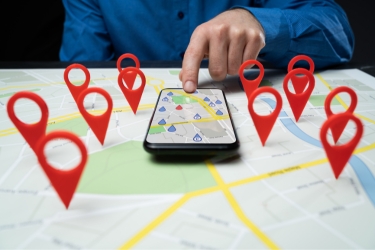Search engine optimization (SEO) is a necessity when marketing your business and building your brand online. But if you're a local business, getting found by nearby customers matters even more. That’s where local SEO citation and directory tips come in. These strategies help your business show up in the right places—when and where people are searching. Local SEO helps small and medium-sized businesses attract nearby customers who are actively searching for services or products like yours.

Local SEO vs. Traditional SEO: Why It Matters
Most business owners understand how traditional SEO helps with higher search rankings, but local SEO is its own strategy. It’s all about making sure your business appears in "near me" searches and on map listings when someone in your area is ready to buy. That visibility can make or break your next sale in a competitive market.
Unlike traditional SEO, which often focuses on national or broad keyword rankings, local SEO targets specific geographic areas. That means optimizing your presence across directories, map apps, and review platforms where local customers are searching. It's not just about being online; it's about being found locally.
Local SEO Citation and Directory Tips that Make an Impact
Let’s break down how local citations (mentions of your business online) and directory listings affect your local visibility—and how to make them work in your favor.
1. Keep Your NAP Consistent Everywhere
Your NAP (Name, Address, and Phone number) should appear exactly the same on every website, directory, and social platform. Even small inconsistencies—like "Ave." vs. "Avenue"—can confuse search engines and hurt your credibility. If you’ve rebranded or moved, double-check your listings across major platforms like Yelp, Google Business, Bing Places, and Apple Maps.
Think of your NAP data as your digital fingerprint. If your contact information isn't identical across all platforms, search engines may struggle to confirm your business identity—which can reduce your visibility in local search results.
2. Complete Every Listing You Claim
Don't just claim your business profile—optimize it. Fill out every field available, including hours, services, website URL, and business description. Add high-quality photos and encourage customer reviews. A well-rounded profile helps you stand out and signals trust to search engines.
Also, take advantage of additional features that platforms like Google Business Profile offer, such as adding posts, answering FAQs, and enabling messaging. These enhancements improve engagement and lead to better visibility in local packs and map results.

3. Show Up in Multiple Directories
Google gathers local business data from multiple sources. The more consistent citations you have across directories, the more confident search engines are in recommending your business.
According to BrightLocal, 94% of consumers use online directories to find local businesses. Being listed on platforms like Yelp, BBB, Yellow Pages, MapQuest, Hotfrog, and niche-specific directories increases your chances of being discovered—and trusted. For example, a plumber might want to appear on HomeAdvisor or Angi, while a dentist may benefit from listings on Healthgrades or Zocdoc.
4. Use Tools to Make It Easier
Managing listings manually can be time-consuming and error-prone, especially when you’re juggling multiple platforms. Fortunately, tools like Moz Local and BrightLocal help automate the process. These tools let you:
- Submit your business information to multiple directories at once
- Track your citations across platforms
- Identify and fix inconsistencies
- Monitor reviews and local rankings
Using these tools saves time and reduces the risk of errors, ensuring your local SEO citation and directory tips are implemented correctly.

5. Get Local Backlinks (Beyond Directories)
Not all citations come from directories. Getting mentioned by local blogs, newspapers, charities, chambers of commerce, or event pages also builds local authority. These are often overlooked opportunities that can give you an edge.
For example, if your business donates to a community fundraiser or sponsors a local school team, you can often receive a link on the organization's website. These backlinks build trust with search engines and increase your relevance for local searches.
You can also write guest posts for local blogs, participate in interviews with local media, or get featured in "Top Business" roundups. Each mention enhances your brand visibility while also boosting SEO value.
6. Understand the Link Types
Some directories use "nofollow" tags, which tell search engines not to pass SEO value through the link. Others use "dofollow" links, which help improve your rankings. While dofollow links are more valuable, even nofollow citations still provide local visibility and referral traffic.
The key is balance. Focus on getting listed in high-authority directories first—those that consistently appear on the first page of search results. Yelp, Google Business, and BBB are examples of trusted platforms that add credibility even if the links are nofollow.

7. Encourage and Monitor Online Reviews
Reviews are a vital part of your local SEO strategy. They influence not just customer perception but also search rankings. Platforms like Google, Yelp, and Facebook weigh the quantity and quality of reviews heavily.
Encourage satisfied customers to leave reviews by making it part of your follow-up process. Respond to both positive and negative feedback professionally. According to BrightLocal, 87% of consumers read online reviews for local businesses—so staying active and engaged can directly affect your conversions.
Maintain What You Build
Citations aren't "set it and forget it." It's important to stay organized and proactive.
- Keep a list of your listings. Track where you're listed and when they were last updated.
- Update regularly. Some platforms remove listings after inactivity. Review them quarterly and check for outdated info or negative reviews.
- Balance consistency and creativity. Your NAP must be consistent, but your business description can vary slightly. Just keep the first sentence consistent and adjust the rest based on the platform.
Bonus Tip: Audit Your Listings Annually
At least once a year, conduct a local SEO audit. Tools like BrightLocal and Moz Local offer scanning features that reveal duplicate listings, inconsistencies, or missing directories. This annual check-in ensures your citations remain accurate and up to date.
Local SEO Doesn’t Have to Be Complicated
If this all sounds like a lot, that’s because it can be—especially when you're running a business. Most small businesses don’t have time to manage dozens of citations and listings.
That’s where we come in. At E-Marketing Associates, we help businesses like yours get found by the right people at the right time. Our small business SEO services are designed to boost your local visibility while you focus on running your business.
Let’s grow your local presence, one citation at a time.








.jpg)















